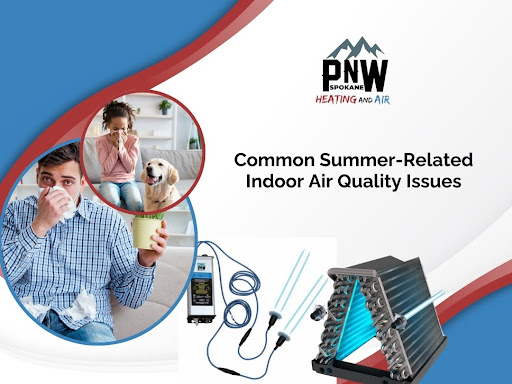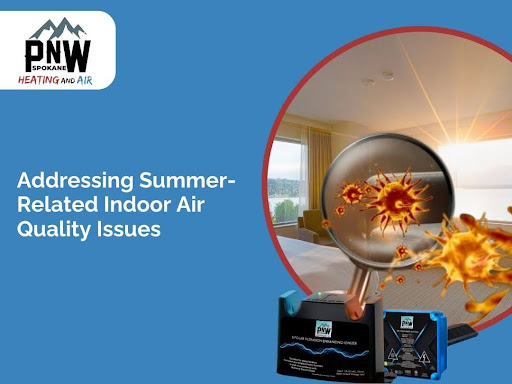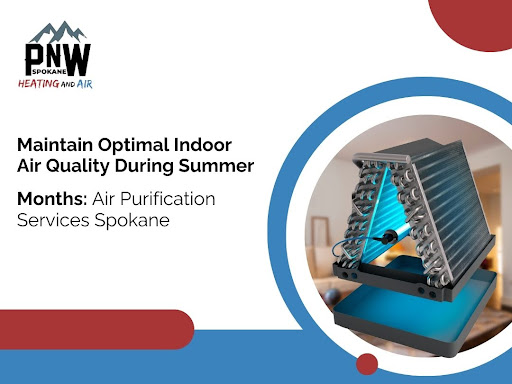As the summer heat intensifies, many homeowners find themselves relying heavily on their HVAC systems to stay cool. However, increased HVAC usage can lead to potential indoor air quality issues. Maintaining optimal air quality during the hot summer months is crucial for your health and comfort. In this blog, we’ll explore practical tips for improving and maintaining the air quality in your home. Whether you’re dealing with allergies or asthma, or simply want a cleaner, healthier living environment, understanding how to address air quality concerns is essential.
All You Need to Know About the Indoor Air Quality
During summer, many people spend more time indoors to escape the heat. However, the indoor environment can often be more polluted than the outdoors due to various factors such as poor ventilation, increased use of air conditioning, and accumulation of dust and allergens. Poor indoor air quality can lead to health problems such as respiratory issues, allergies, and worsened asthma symptoms. Therefore, maintaining optimal indoor air quality is not just about comfort, but also about ensuring a healthy living environment for you and your family.
Common Summer-Related Indoor Air Quality Issues

Understanding these common problems can help you take proactive steps to ensure a healthy and comfortable indoor environment. Here are some prevalent summer-related Indoor Air Quality (IAQ) issues:
1. Increased Allergens
During the summer months, allergens such as pollen, mold spores, and dust mites become more prevalent. Trees, grasses, and weeds produce pollen that floats in the air and can easily make its way inside a home through windows and doors; they can also come in through dirty clothes or even on a pet’s fur. Once inside, these allergens can circulate through your HVAC system and settle on various surfaces, leading to allergy symptoms such as sneezing, itchy eyes, and congestion.
2. High Humidity Levels
Summer often brings high humidity, especially in regions with warmer climates. Excess moisture in the air can lead to several problems, excess moisture in the air can lead to several problems:
Mold Growth:High humidity creates a favorable environment for mold and mildew to thrive. Mold spores can become airborne and contribute to poor indoor air quality, potentially causing respiratory issues and allergic reactions.
Dust Mites:These tiny creatures flourish in humid environments. They can trigger allergic reactions and asthma symptoms when their waste particles become airborne.
Discomfort: High humidity can make indoor spaces feel warmer and stickier, reducing overall comfort and potentially leading to health issues.
3. HVAC System Overload
With increased temperatures, your HVAC system works harder to maintain a comfortable indoor environment. This can lead to:
Dust Accumulation: As the system runs more frequently, dust and debris can accumulate in the ducts and filters. If not regularly cleaned or replaced, this buildup can decrease the system’s efficiency and compromise air quality.
Increased Wear and Tear: Overworking your HVAC system can lead to mechanical issues or breakdowns. A poorly maintained system may not effectively filter the air, allowing contaminants to circulate.
4. Volatile Organic Compounds (VOCs)
VOCs are chemicals emitted from various sources, including air conditioning units, cleaning products, and even some building materials. During the summer, increased use of air conditioning can cause VOCs to accumulate if the system isn’t properly ventilated. Exposure to high levels of VOCs can cause headaches, dizziness, and other health issues.
5. Poor Ventilation
Summer often means keeping windows and doors closed to maintain a cool indoor temperature. While this helps with cooling efficiency, it can also lead to poor ventilation. Insufficient airflow can trap indoor pollutants and exacerbate air quality issues. Without proper ventilation, CO2 levels can rise, leading to a stuffy, uncomfortable atmosphere.
6. Heat-Related Contaminants
High temperatures can contribute to the release of certain contaminants from building materials and household products. For example:
Formaldehyde: Found in some pressed wood products and other materials, formaldehyde levels can increase with higher indoor temperatures, leading to respiratory irritation and other health issues.
Odors: Heat can intensify odors from cooking, pets, or other sources. These odors can linger and impact indoor air quality.
Addressing Summer-Related Indoor Air Quality Issues

1. Regular HVAC Maintenance
One of the most effective ways to ensure good indoor air quality is to regularly maintain your HVAC system. This includes changing air filters frequently, cleaning ducts and vents, and scheduling professional inspections. HVAC maintenance can help prevent the buildup of dust, allergens, and other pollutants in your home.
2. Utilize Air Purifiers
Air purifiers are highly effective at removing contaminants from the air. Look for air purification services in Spokane that offer advanced purification systems capable of capturing allergens, dust, and even VOCs. Since the air in your homes gets recirculated, getting an air purifier will help to enhance the quality of air you breathe thus making your home healthier.
3. Control Humidity Levels
Some features to consider are the levels of humidity because high humidity is usually an indication of mold and mildew. You should use them in the rooms that are mostly affected by humidity like the bathroom or the basement. Air quality specialists in Spokane can provide recommendations on the best dehumidification solutions for your home.
4. Keep Windows and Doors Closed
While it might be tempting to open windows and doors to let in fresh air, doing so can also invite allergens and pollutants into your home. Keep windows and doors closed as much as possible, and use air conditioning to circulate and filter the air.
5. Regular Cleaning
Regular cleaning can help reduce the presence of dust, pet dander, and other pollutants in your home. Vacuum carpets and upholstery frequently, dust surfaces, and wash bedding regularly. Consider using a vacuum with a HEPA filter to capture smaller particles.
How Can Indoor Air Quality Testing in Spokane Make a Difference?
To effectively address indoor air quality issues, it is essential to understand the specific pollutants present in your home. This is where Spokane indoor air quality testingcomes into play. Professional testing services can identify the presence of allergens, mold, VOCs, and other pollutants. With this information under your belt, you can then begin to make specific changes to increase your IAQ.
Choosing the Right Air Quality Specialists in Spokane
When it comes to improving indoor air quality, it’s important to work with experienced professionals. Here are some tips for choosing the right air quality specialists in Spokane:
1. Look for Certification and Experience
Ensure that the specialists you choose are certified and have extensive experience in indoor air quality testing and remediation. Certified professionals are more likely to provide reliable and effective services.
2. Check Reviews and Testimonials
Reading reviews and testimonials from previous clients can provide valuable insights into the quality of service offered by air quality specialists. Look for companies with a track record of satisfied customers and successful outcomes.
3. Comprehensive Services
Select an organization that provides all the services such as air quality testing, HVAC, air purification, and humidity control services. This ensures that all aspects of indoor air quality are addressed.
4. Customized Solutions
Every home is different and indoor air quality solutions should be tailored to your specific needs. Look for specialists who offer customized solutions based on the unique characteristics of your home and the specific pollutants present.
Conclusion
Maintaining optimal indoor air quality during the hot summer months is essential for your health and comfort. By taking proactive steps such as regular HVAC maintenance, using air purifiers, controlling humidity levels, and working with professional air quality specialists in Spokane,you can ensure a clean and healthy indoor environment. Remember, Spokane indoor air quality testingis a crucial first step in identifying and addressing specific pollutants in your home. With the right approach and professional support, you can enjoy a cool, comfortable, and healthy summer season indoors.

